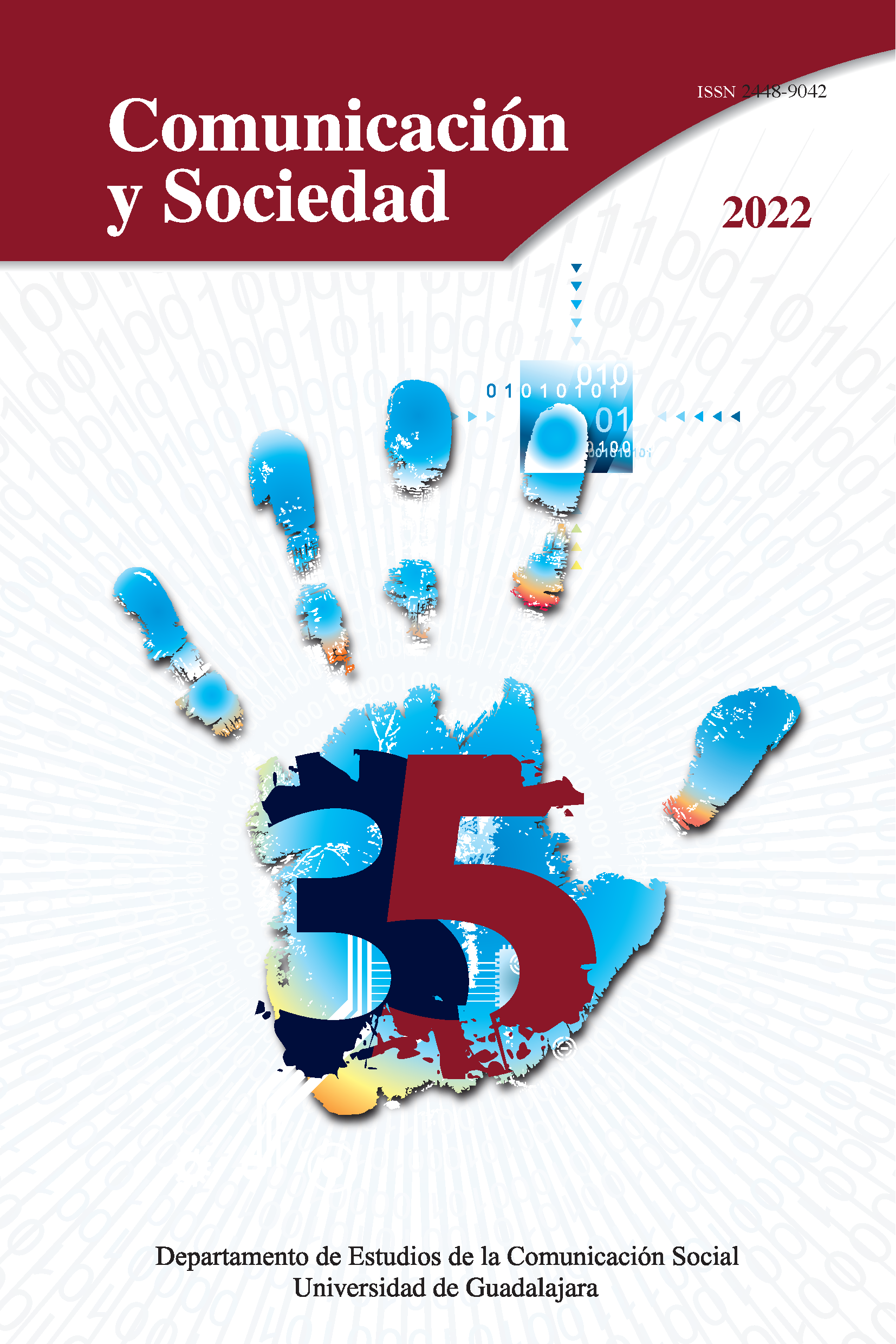Usos de Facebook y duelo: expresión emocional y búsqueda de apoyo en redes sociales
DOI:
https://doi.org/10.32870/cys.v2022.7911Palabras clave:
Duelo, Emociones, Apoyo social, Interacciones digitales, FacebookResumen
Este artículo analiza los usos de Facebook relacionados con el duelo por parte de mujeres que han perdido a una persona amada. Se realizó una investigación cualitativa a partir del método fenomenológico-hermenéutico en la que se entrevistaron 29 mujeres en duelo. Los resultados indican que Facebook es una plataforma para la expresión emocional y la búsqueda de apoyo. Esta investigación aporta a la comprensión de prácticas comunicativas en medios digitales que convierten en borrosos los límites entre lo público y lo privado durante experiencias de crisis.Descargas
Citas
Ayala, R. (2008). La metodología fenomenológica-hermenéutica en el campo de la investigación educativa. Posibilidades y primeras experiencias. Revista de Investigación Educativa, 26(2), 409-430. https://revistas.um.es/rie/article/view/94001
Bermejo, J., Villacieros, M. & Fernandez-Quijano, I. (2016). Escala de mitos en duelo. Relación con el estilo de afrontamiento evitativo y validación psicométrica. Acción Psicológica, 13(2), 129-142. http://dx.doi.org/10.5944/ap.13.2.15965
Blower, J. & Sharman, R. (2019). To grieve or not to grieve (online)? Interactions with deceased Facebook friends. Death Studies, 45(3), 167-181. http://dx.doi.org/10.1080/07481187.2019.1626937
Bossetta, M. (2018). The Digital Architectures of Social Media: Comparing Political Campaigning on Facebook, Twitter, Instagram, and Snapchat in the 2016 U.S. Election. Journalism & Mass Communication Quarterly, 95(2), 471-496. http://dx.doi.org/10.1177/1077699018763307
Bravo, V. (2017). Coping with dying and deaths at home: how undocumented migrants in the United States experience the process of transnational grieving. Mortality, 22(1), 33-44. http://dx.doi.org/10.1080/13576275.2016.1192590
Bucher, T. & Helmond, A. (2018). The Affordances of Social Media Platforms. En J. Burgess, A. Marwick & T. Poell (Eds.), The SAGE Handbook of Social Media (pp. 233-253). Sage.
Cesare, N. & Branstad, J. (2018). Mourning and memory in the twittersphere. Mortality, 23(1), 82-97. http://dx.doi.org/10.1080/13576275.2017.1319349
Diregrov, K., Diregrov, A. & Jhonsen, I. (2013). Participants’ recommendations for the ideal grief group: a qualitative study. OMEGA, 67(4), 366-377. http://dx.doi.org/10.2190/OM.67.4.b
Dilmaç, J. A. (2016). The new forms of mourning: Loss and exhibitions of the death of the Internet. Omega, 77(3), 280-295. https://doi.org/10.1177/0030222816633240
Döveling, K. (2015). Emotion regulation in bereavement: searching for and finding emotional support in social network sites. New Review of Hypermedia and Multimedia, 21(1-2), 106-122. http://dx.doi.org/10.1080/13614568.2014.983558
Feijoo, B. & García, A. (2016). Mayores universitarios y usos de Facebook. Comunicación y Hombre. Revista Interdisciplinar de Ciencias de la Comunicación y Humanidades, 12, 305-318. https://bit.ly/2FCgzAD
Gamba-Collazos, H. & Navia, C. (2017). Adaptación del Inventario de Duelo Complicado en población colombiana. Revista Colombiana de Psicología, 26(1), 15-30. https://doi.org/10.15446/rcp.v26n1.51205
Giaxoglou, K., Döveling, K. & Pitsillides, S. (2017). Networked Emotions: Interdisciplinary Perspectives on Sharing Loss Online. Journal of Broadcasting & Electronic Media, 61(1), 1-10. https://doi.org/10.1080/08838151.2016.1273927
Glaser, P., Liu, J., Hakim, M., Vilar, R. & Zhang, R. (2018). Is Social Media Use for Networking Positive or Negative? Offline Social Capital and Internet Addiction as Mediators for the Relationship between Social Media Use and Mental Health. New Zealand Journal of Psychology, 47(3), 12-18. https://bit.ly/2Q5YqwU
Gross, J. (2008). Emotion regulation. En M. Lewis, J. M. Haviland-Jones & L. Feldmann Barrett (Eds.), Handbook of emotions (pp. 497-512). Guilford Press.
Gurevich, A. (2016). El tiempo todo en Facebook. Aposta. Revista de Ciencias Sociales, 69, 217-238. https://bit.ly/34dgkX6
Hartig, J. & Viola, J. (2016). Online Grief Support Communities: Therapeutic Benefits of Membership. OMEGA-Journal of Death and Dying, 73(1), 29-41. https://doi.org/10.1177/0030222815575698
Keskinen, N., Kaunonen, M. & Aho, A. L. (2019). How loved ones express grief after the death of a child by sharing photographs on Facebook. Journal of Loss and Trauma, 24(7), 609-624. https://doi.org/10.1080/15325024.2019.1586186
Lamilla, E. (2016). Perfiles anhelados. Correspondencia de lenguajes y estéticas entre el Cementerio Museo San Pedro y la red social Facebook. Antípoda. Revista de Antropología y Arqueología, 26, 115-132. http://dx.doi.org/10.7440/antipoda26.2016.05
Lambert, A., Nansen, B. & Arnold, M. (2018). Algorithmic memorial videos: Contextualising automated curation. Memory Studies, 11(2), 156-171. https://doi.org/10.1177%2F1750698016679221
Monge, V. (2015). La codificación en el método de investigación de la grounded theory o teoría fundamentada. Innovaciones Educativas, 17(22), 77-84. https://doi.org/10.22458/ie.v17i22.1100
Moore, J., Magee, S., Gamreklidze, E. &. Kowalewski, J. (2019). Social Media Mourning: Using Grounded Theory to Explore How People Grieve on Social Networking Sites. Omega: Journal of Death & Dying, 79(3), 231-259. http://dx.doi.org/10.1177/0030222817709691
Moyer, L. & Enck, S. (2018). Is my grief too public for you? The digitalization of grief on Facebook. Death Studies, 44(2), 89-97. https://doi.org/10.1080/07481187.2018.1522388
Perluxo, D. & Francisco, R. (2017). The Use of Facebook in the Maternal Grief Process: An Exploratory Qualitative Study. Death Studies, 42(2), 79-88. https://doi.org/10.1080/07481187.2017.1334011
Salgado, A. (2007). Investigación cualitativa: diseños, evaluación del rigor metodológico y retos. Liberabit, 13(13), 71-78. https://bit.ly/3aFgkjQ
Schettini, P. & Cortazzo, I. (2016). Técnicas y estrategias en la investigación cualitativa. Editorial de la Universidad de la Plata.
Serrano-Puche, J. (2016). Internet y emociones: nuevas tendencias en un campo de investigación emergente. Comunicar, 46(24), 19-26. http://dx.doi.org/10.3916/C46-2016-02
Strauss, A. & Corbin, J. (2002). Bases de la investigación cualitativa. Técnicas y procedimientos para desarrollar la teoría fundamentada. Contus.
Tudela de Marcos, S. & Barrón, A. (2017). Redes sociales: del ciberacoso a los grupos de apoyo online con víctimas de acoso escolar. Escritos de Psicología, 10(3), 167-177. http://dx.doi.org/10.5231/psy.writ.2017.3011
Willis, E. & Ferrucci, P. (2017). Mourning and Grief on Facebook: An Examination of Motivations for Interacting with the Deceased. Omega: Journal of Death & Dying, 76(2), 122-140, https://doi.org/10.1177/0030222816688284
van Manen, M. (2003). Investigación educativa y experiencia vivida. Ciencia humana para una pedagogía de la acción y de la sensibilidad. Idea Books.
Descargas
Publicado
Cómo citar
Número
Sección
Licencia
Derechos de autor 2021 Andrés Marín-Cortés, Sandra Quintero, Sebastián Acosta, Andrés García, Fredy Gómez

Esta obra está bajo una licencia internacional Creative Commons Atribución-NoComercial 4.0.
Los autores/as que publiquen en esta revista aceptan las siguientes condiciones:
De acuerdo con la legislación de derechos de autor, los autores conservan los derechos de autoría y otorgan a Comunicación y Sociedad el derecho de primera comunicación pública de la obra. Comunicación y Sociedad no realiza cargos a los autores por enviar y procesar artículos para su publicación.
Los autores/as pueden realizar otros acuerdos contractuales independientes y adicionales para la distribución no exclusiva de la versión del artículo publicado en Comunicación y Sociedad (por ejemplo incluirlo en un repositorio institucional o publicarlo en un libro) siempre que indiquen claramente que el trabajo se publicó por primera vez en Comunicación y Sociedad.











